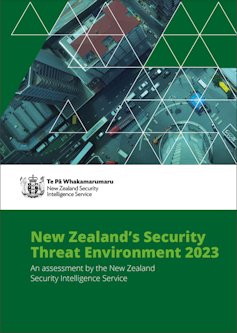why making NZ’s security threat assessment public for the first time is the right move
- Written by Alexander Gillespie, Professor of Law, University of Waikato

Today’s release of the threat assessment[1] by the New Zealand Security Intelligence Service (SIS) is the final piece in a defence and security puzzle that marks a genuine shift towards more open and public discussion of these crucial policy areas.
Together with July’s strategic foreign policy assessment[2] from the Ministry of Foreign Affairs, and the national security strategy[3] released last week, it rounds out the picture of New Zealand’s place in a fast-evolving geopolitical landscape.
From increased strategic competition between countries, to declining social trust within them, as well as rapid technological change, the overall message is clear: business as usual is no longer an option.
By releasing the strategy documents in this way, the government and its various agencies clearly hope to win public consent and support – ultimately, the greatest asset any country possesses to defend itself.
Low threat of violent extremism
If there is good news in the SIS assessment, it is that the threat of violent extremism is still considered “low”. That means no change since the threat level was reassessed last year, with a terror attack considered “possible” rather than “probable”.
It’s a welcome development since the threat level was lifted to “high” in the immediate aftermath of the Christchurch terror attack in 2019. This was lowered to “medium” about a month later – where it sat in September 2021, when another extremist attacked people with a knife in an Auckland mall, seriously injuring five.
Read more: NZ’s first national security strategy signals a 'turning point' and the end of old certainties[4]
The threat level stayed there during the escalating social tension resulting from the government’s COVID response. This saw New Zealand’s first conviction for sabotage[5] and increasing threats to politicians, with the SIS and police intervening in at least one case to mitigate the risk.
After protesters were cleared from the grounds of parliament in early 2022, it was still feared an act of extremism by a small minority was likely.
These risks now seem to be receding. And while the threat assessment notes that the online world can provide havens for extremism, the vast majority of those expressing vitriolic rhetoric are deemed unlikely to carry through with violence in the real world.
Read more: The 'number 8 wire' days for NZ's defence force are over – new priorities will demand bigger budgets[6]
Changing patterns of extremism
Assessments like this are not a crystal ball; threats can emerge quickly and be near-invisible before they do. But right now, at least publicly, the SIS is not aware of any specific or credible attack planning.

















